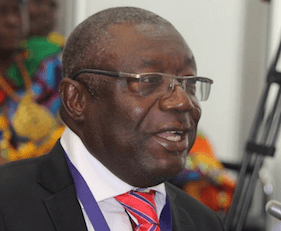Our priority is to digitise nation’s economy – Minister

Dr Kwaku Afriyie, the Western Regional Minister, has said government would continue to make the needed efforts to digitize the country’s economy.
He said this is the reason why the President Nana Addo Danquah Akufo-Addo administration has taken deliberate policy reforms to digitize institutions such as the National Digital and Property Addressing System (NDPAS), the National Identification System, the Automation of the Paperless system of the country’s ports, the interoperability of payment systems in the financial sector and Driver and Vehicle Licensing Authority.
He said this at separate sensitisation workshops held together with Mr Thomas Yaw Adjei Baffoe, the Deputy Central Regional Minister in the Western and Central regions on the NDPAS, for Metropolitan, Municipal and District Chief Executives, Coordinating Directors and Development and Planning Officers.
Dr Afriyie said it is aimed at promoting e-commerce, e-governance, economic growth, improved revenue mobilisation for Metropolitan, Municipal and District Assemblies and for easy identification and location of business and properties.
The workshops also saw the inauguration of the Regional Spatial Planning Committees in accordance with Section 26 of the Land Use and Spatial Planning Act, 2016 (Act 925) and would be replicated in all the other regions.
The committees include; the Regional Ministers as Chairpersons, Regional Coordinating Director, Regional Heads of LUSPA, Ghana National Fire Service, Environmental Protection Agency, Ghana Highway Authority, Forestry Commission, Water Resources Commission, Representatives of the Utility Service Providers and Regional House of Chiefs and the National Disaster Management Organisation as members.
Their functions are to prepare a Regional Spatial Development Framework for their various regions in consultation with the MMDAs, prepare sub-regional or multi districts Spatial Development Frameworks for more than one district within the regions, adjudicate on appeals or complaints resulting from actions or inactions of the District Spatial Planning Committees of the Assemblies.
Dr Afriyie said there is the need to ensure that Metropolitan, Municipal and District Assemblies (MMDAs) identify their economic potentials for growth, especially within the framework of Government’s commitment to formalising the economy to improve e-commerce.
The workshop is to adequately educate the participants on the expected activities and outcomes of the initiative of Government and to prepare them to continue and successfully deploy the Ghana Post GPS and complete the Street Naming exercise.
He said Government is committed to leveraging on the potentials of the Metropolitan, Municipal and District Assemblies to deliver a well-functioning NDPAS and Naming and Digitisation of Property as a catalyst for achieving greater development in the country.
The Minister said an effective implementation of the NDPAS and Street Naming Programme would have an impact on revenue mobilisation for MMDAs.
He said the Ministry of Local Government and Rural Development was focused on ensuring that Digitisation of Property would lead towards opening up the economy and supporting MMDAs to improve revenue generation.
Mr Baffoe said one of the key departments whose work is essential for an effective implementation of the NDPAS and Street Naming was the LUSPA, per the Land Use and Spatial Planning Act, 2016 (Act 925) which established the Authority with a Governing Board at the national level and Regional Offices of the Authority with Spatial Planning Committees.
He said the LUSPA is expected to provide sustainable development of land and human settlements through a decentralised planning system, ensure judicious use of land and to enhance the attainment of the decentralisation programme by creating an enabling environment for MMDAs to better perform the spatial planning and human settlements management’s functions.
Mr Baffoe said it is important to note that the vision of the Street Naming and NDPAS was to achieve nationwide use of Spatial Data Information for good governance and socio-economic development through the development, management and dissemination of a Property Addressing system linked with Postal Codes and to ensure total access to high-quality geographic information and related services for all organisations and individuals’ in the country.
This, she said, was also aimed at improving quality and reducing costs related to geographic information, reduce duplication of effort among agencies and to make geographic data more accessible to the public.
The Deputy Regional Minister said the informal nature of Ghana’s economy is a major constraint to development efforts affecting the nation’s ability to broaden her tax base, deepen and widen financial inclusion and deliver services to those most in need.
He said to create a formal economy, it was imperative to provide a platform for easy data generation, as well as the identification of location of homes, offices; and the successful implementation of the ‘GhanaPostGPS’ would help the use of landmarks as a traditional means of giving directions to various locations in the country.
“It would also lower the cost of doing business and enable security agencies to easily identify and deal with crime and other security situations.”
Mr Chapman Owusu-Sekyere of the LUSPA from the Ghana Post took the participants through various stages for them to understand the processes and importance of the exercise.
Source: GNA
